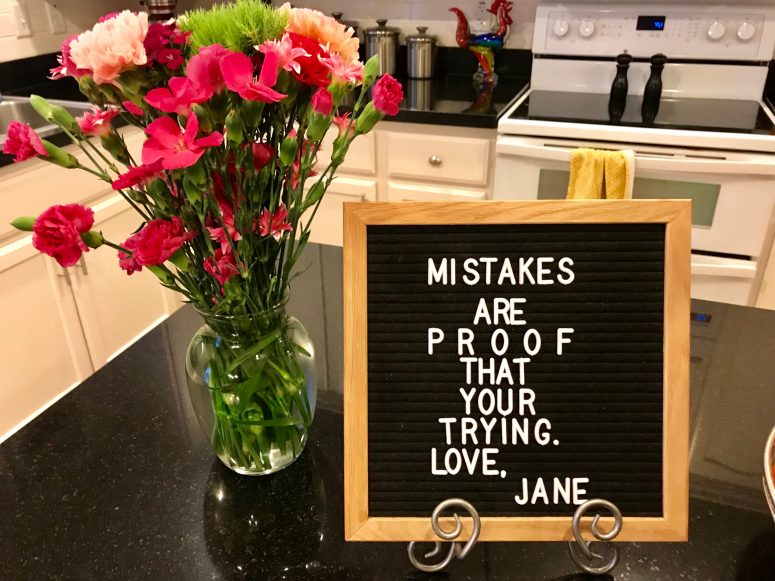
I made a boo-boo at work yesterday. The client I was working with was very understanding, forgiving, and even accepted some of the blame. But I felt pretty rotten about the oversight.
Now, I’m not a perfectionist because done is better than perfect. But I couldn’t shake my disappointment of letting them down. So much so that I continued to worry about my mistake into the night.
Then I awoke to the above new sign on display in our kitchen today, which was ironically crafted by my eight year old daughter. It immediately cheered me up. Partly because I learned some things from my mistake and instituted two immediate changes that will make me a better writer. But also because the sign reminded me that it’s okay to make mistakes.
Showing up really is half the battle. As my friend David says, “You gotta play some sour notes in order to make your sound sweeter.” I’m grateful of those simple truths that make improvement possible.
Thanks, Jane.
This story first published to blakesnow.com in 2018
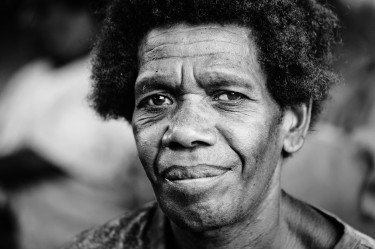
Wikimedia Commons
One of my goals in life is to become a centenarian, someone over 100 years of age. A few years ago, a team of researchers identified four areas that had the highest number of centenarians per capita in the world. They studied these people, wrote a book about them, then distilled their similar lifestyles down to a set of consistent life-giving habits.
And by life giving, I really mean death halting. Since there’s no brake on death, the best you can do is ease off the accelerator. With my added commentary, here are eight ways to do just that, as compiled by author Dan Buettner:
- Find a physical activity you enjoy and keep doing it. Do it for as long as you enjoy it. If and when you tire of that activity, find something else that pleases you. For example, you could start jogging, and if that becomes a bore, move to biking. Then swimming. Then Pilates. Then kickboxing. Then underwater basket weaving. Whatever it is, be sure to do it at least three times a week, moreso for idle or cubicle people. (In my case, since I sit at a desk and work from home, I have to move a lot more than most people to achieve the optimal amount of fitness.)
- Stop eating when you’re no longer hungry, as opposed to being full. There’s a difference. About 20% less food per meal, in fact. In short, this is the best known way to eat less. Stop when satisfied instead of stuffing yourself. Continue reading…
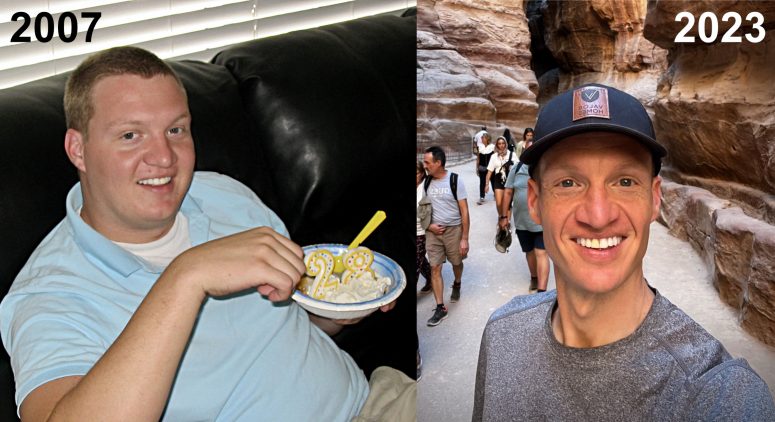
Sixteen years ago, I was in the worst physical and mental shape of my life. I was a work-a-holic, Internet addict who never exercised and mostly ate junk food. When the food was healthy, such as my wife’s home-cooked meals, I always ate 2-3 plates.
The next year, I lost a lot of weight, abandoned narcissism, disconnected, and started living large on low-caloric technology. I even wrote a best-selling book about it.
In the proceeding years, I maintained that balance. But I was still 5-10 pounds more than my doctor wanted after my back surgery. “The lighter you are, the longer your back will last,” he said.
This year, I finally shed those last 10 pounds, plus an extra five for insurance (because I quickly gain five pounds sometimes, especially on vacation). That way I’m never over my target weight, which makes me feel good about how I’m treating my back and extending my physical health.
I’m not sharing this to sell you anything. In fact, my mostly vegetarian diet is free of charge and basically this: eat real food, mostly plants, not too much, and only dessert on special occasions. On top of that, I rigorously exercise for 21 minutes each weekday and play soccer three times a week.
Why, then, would I hurl something so superficial onto the internet? Because people can change. Maybe you don’t need any changes. But most of us do. I’m grateful for a lifetime of change where each of us can learn and grow at or own pace and by our own free will and choice.
To be fair, life was still beautiful all those years ago. And I was more than the sum of my weight and mental compulsions. But I’m grateful to have achieved peak health this year and hope to inspire others to do the same.
If I can do it over 16 years, anyone can.
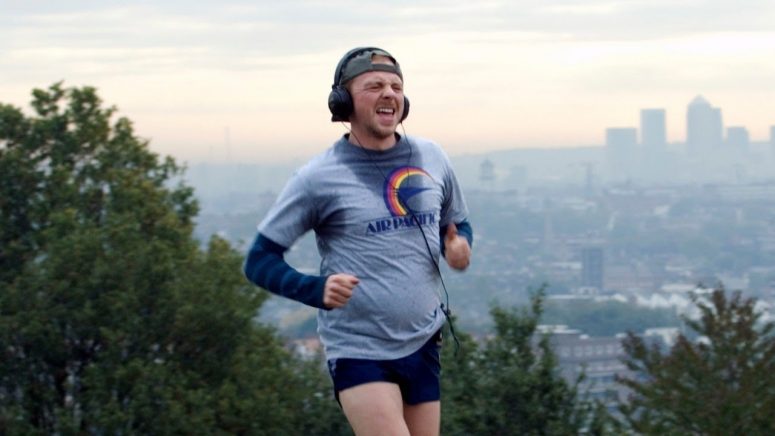
Ten years ago, I had back surgery for the second time. Because my spine was fused, total recovery was six months—an eternity for a busy-body like me.
The first two months of little to no physical activity made me restless. The next several months of low-impact workouts was emasculating. Basically all of the participants on YouTube were senior citizens, if not gray-haired women.
That’s not a bad thing. But it was for a thirty-something like me who was impatiently wanting to return to full activity. Continue reading…

Getting rich in five years is one thing. But living richly involves a lot more than just money.
Indeed, many people are rich in cash but poor in assets, broke on time, impoverished in relationships, destitute in health, and underprivileged in experiences and ongoing education. Of course, the inverse is true too. Poor people can be rich in many other areas that matter.
What can each of us do, then, to ensure we’re living richly in most, if not all, major aspects of life, regardless of income? While I don’t have all the answers, this is what I know for sure: Continue reading…

Courtesy Shutterstock
Once upon a time, I played adult fast-pitch baseball for several years in my late 20s. It was incredibly intimidating, since I played against several ex-major leaguers and college players. Some guys threw in the upper 80s, even, which is unnerving at best and scary as hell at worst!
Anyways, I started at right field, which baseball fans know is where you put the worst fielder. But I usually batted third, fourth, or fifth, which is where big hitters usually line up.
Only problem was, I wasn’t a big hitter. Why did my coach put me there?
Because I had one goal—get on base. What’s the easiest way to do that? Hit singles or walk. So that’s what I did.
I hit a lot of singles back then. Walked a lot too. I never swung for the fences and always made the pitcher work for three strikes, which is very hard hard to do at amateur levels, especially if the hitter isn’t swinging. So I only swung at strikes.
Halfway into the season, my teammate Russ pulled me aside and asked, “Have you looked at your online stats?”
“No,” I replied. As a rookie, I didn’t even know that was possible. “Well you’re leading the team in RBIs (runs batted in) and have an on-base percentage over 70%. NICE WORK!”
That praise and realization felt good. But it also reminded me of an important life lesson: thinking small often leads to big results. Since small ball is boring and unglamorous, however, not many people engage in it. Big ball, you see, gets most of the fame and attention.
Obviously, big ball works too. Maybe just as much, if not more, than small ball. But big ball is harder to pull off. It requires more skill and God-given talent. I’m often short on that.
So I in life, business, and baseball, I usually choose small ball.
PS—Small ball works in all aspects of life and sport, not just baseball. For example, Italy plays some of the smallest, most boring soccer you will ever see. But they are tied for second for most World Cups. Because small ball works.
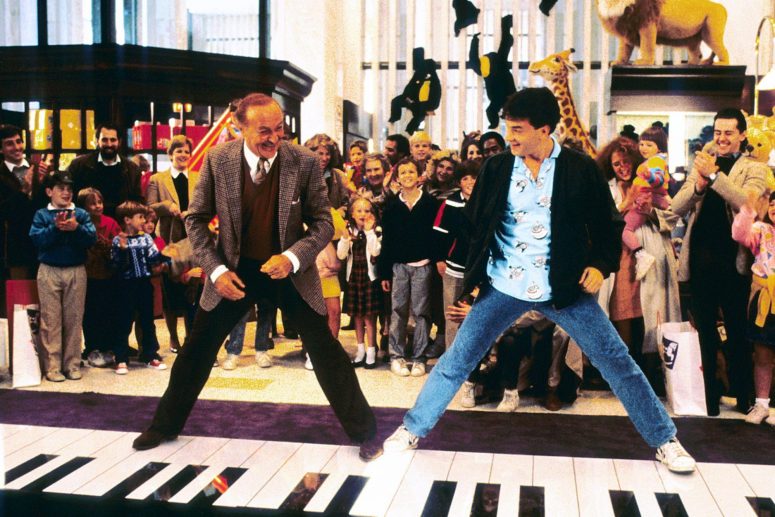
Courtesy 20th Century Fox
$375 an hour is a lot of money. It was even more money 20 years ago when a bougie investment bank paid me that to share my honest opinion with some of its biggest customers.
Many people don’t know this, but I got my start in writing covering video games of all things. It was the ideal subject for an early twenty-something like me. I threw myself into the “work,” was one of the most prolific tech bloggers for AOL (aka America On-Line), and had a blast attended game conferences, interacting with readers, and crafting sentences for a living. It was a lot like Tom Hanks character from Big. I was getting paid to play with toys and critique commercial art.
The pay wasn’t great. But when paired with magazine freelancing, it was enough to support my small, apartment-living family. I’m smiling right now just thinking about it. Continue reading…

My daughter recently asked how someone gets rich. Before I share my answer, it’s important to distinguish rich from wealthy (and upper middle class).
Rich is having a high income, typically north of $300,000 a year in America, regardless of debt. Wealthy is possessing a large amount of money, property, assets, savings, and/or investments relative to debt (aka “high net worth”).
For reference, the lower economic class makes less than $50,000 a year; middle class between $50-150k, and upper middle class between $150-300k. Super rich (just 1% of Americans) make half a million a year or more.
Depending on how fast you spend money, it’s possible to be “rich but broke.” It’s also possible to become wealthy over time without ever being technically rich in any given year. And depending on your lifestyle, where you live, and your family status, it’s possible to live rich and/or approach wealth without hitting those exact numbers.
That said, there are five proven ways to make a lot of money. They are as follows: Continue reading…
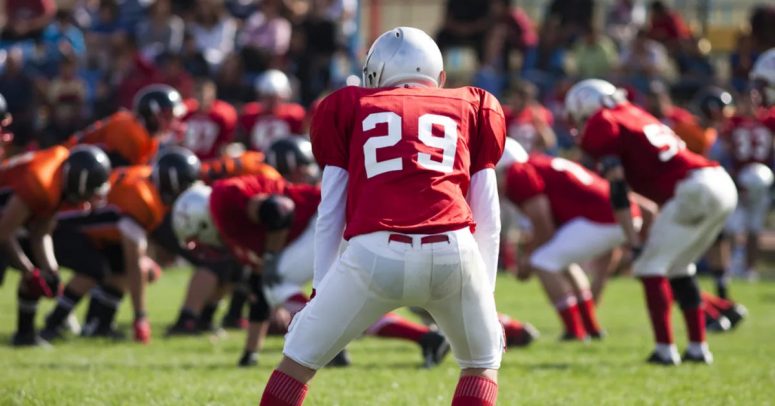
Courtesy Shutterstock
Much of my family enjoys watching football with me in the fall and winter. It’s the most TV we watch all year.
Between both college and pro, we’ve enjoyed a lot of exciting games this year. But one in particular stands out. And not because of the result.
Midway through the season, Washington (where my wife is from) nearly pulled off an incredible upset of a highly ranked team. It was back and forth football for a full four quarters. Really great stuff.
On the very last play, however, Washington lost.
That’s not the story that matters, though. A few moments after the game ended, my son Jack turned to his mother and I and said, “That was a close game. Good job to the team that won.”
I was so proud of him for not confusing loyalty with entertainment. Better yet, he’s already beginning to understand what it means to be magnanimous, an elusive trait that makes the world a better place.
I was proud of the example he set and hope to demonstrate the same attitude whenever my favorite team loses.
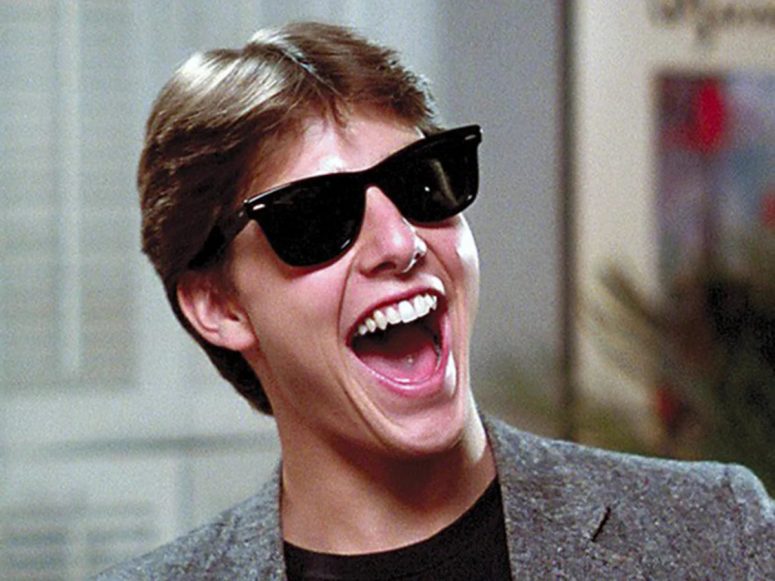
Courtesy Warner Bros.
I’ve been writing full-time on a professional basis for almost two decades. In that time, I’ve written two books, hundreds or reports, and thousands of articles.
To publish that amount of work, I’ve also committed tens of thousands of mistakes. Maybe more. My last book alone contained thousands of errors after my editor bled all over it. On top of that, I was born with bad diction, and am subjected to nasty hate mail after some of my mistakes.
Why am I telling you this?
Because in both life and writing, mistakes are an everyday thing. In fact, the latter happen every minute. That’s because language and communication are incredibly complex, even for professionals like me who get paid to write fewer mistakes than you do. The sooner you accept, if not embrace, mistakes, the better writer you’ll be. Continue reading…
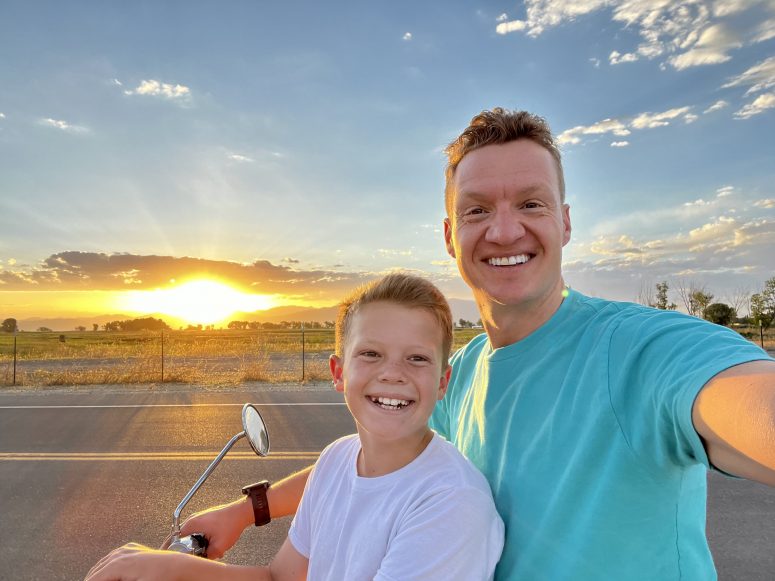
Kids say the darnedest things. But their mental fortitude is even more impressive.
After recently losing his first basketball game by a whopping 12 buckets, my son Max (pictured) turned to one of his teammates and said, “It’s okay—we’re still cool.”
His mother and I laughed, of course. But it was obvious this friend was familiar with the sentiment. We asked Max about it later. He said he and his friends often say this to each other whenever they screw up.
I love this mentality. We all make mistakes. But that doesn’t diminish our value, Max says. Brilliant!

Courtesy Yue Minjun
Over the years I’ve observed first-hand how great art often comes from the most tormented people. Musicians, movie stars, writers, entrepreneurs.
As I’ve written before, to become an icon (if not achieve worldwide greatness), you have to sacrifice just about everything else in life, which often makes said person a one-dimential, incredibly driven, and often sociopathic.
Is it possible, however, for happy, well-balanced, and/or multi-dimensional people to create great art? Joseph Berger, an artist from New York, sure thinks so.
“The perpetuation of the long suffering mythology of art is a thing which makes me unhappy,” he writes. “It is promulgated by people who have either never suffered enough to really know what suffering is, or otherwise by happy idiots who have never done a worthwhile thing in their lives, and by people who watch way to much TV or its equivalent, and buy the shopworn notion of art and artists, which predicates itself on a cultural aesthetic that is arcane at best, and insulting to the very fabric of the quality of mind that art does require. Art has nothing to do with any single emotional state of being. Art is thing that people do, just the same as feelings of all sorts are things that we each experience. And I am far more concerned about the state of mind of the person driving a car on a highway in vicinity of mine, and how their emotional state affects their driving in the moment than I am about how it affects their art.”
As a self-prescribed multi-dimentional, well-balanced, and happy artist, I sure hope so.

Frankenstein back with 28 staples (credit: Lindsey Snow)
Life isn’t fair.
I was born with an 80 year-old back. Not exactly 80, but old. It first broke when I was 29. After surgery, it worked again, but only for another six years. It teetered and failed again late this summer in the same spot — a re-ruptured L4/5 disc. The thing was so decrepit, my surgeon had to remove the remains and fuse my spine.
Now I’m resigned to a life of low impact and light lifting. I can’t even hold my youngest brown-eyed boy in his final months of baby-dom, let alone lift a gallon of milk for a month. I can’t return to full activity for six months until the vertebrae fully fuse. And after that, I’m advised to give up running, basketball, soccer, and maybe wake boarding or else.
It sucks.
But it’s not all bad. In fact, I’ve got a heck of a lot to look forward to—a lot more to live for. While having my body deteriorate ahead of schedule and the long recovery are both humbling, I also feel inspired by the experience. Here are 10 things I learned post surgery: Continue reading…

This is a photo of my wife Lindsey taken 10 years ago in Twin Falls, Idaho. She has her hands full. At my request, she wasn’t thrilled with the idea of a family photo while driving back home. But she’s holding it together, juggling the kids, smiling for the camera.
The next month, she would unknowingly become pregnant with our fifth child. Surprise!
I love this photo. It perfectly captures the chaotic, selfless, and devoted life of not only my own wife, but mothers in general.
Truth be told, I wouldn’t be where I am today without my wife. I don’t mean that in a vague, feel-good type way. I literally mean I wouldn’t be the full-time writer I am today without my wife. Let me explain. Continue reading…
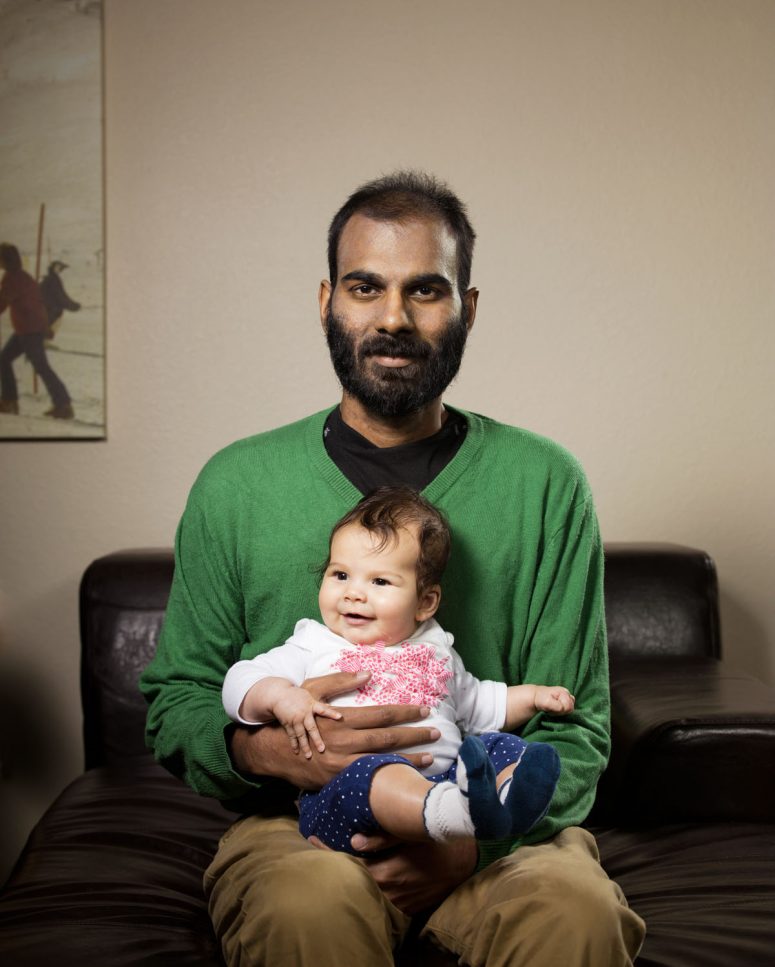
I recently finished When Breath Becomes Air by Paul Kalanithi. I was utterly moved by this powerful account of Kalanithi’s own life as a neurosurgeon, the most demanding physician in the world, and his own premature death in his mid thirties after contracting terminal cancer.
Not only was Kalanithi a paragon brain surgeon, though, he is an absolute poet on the meaning of life, the humanity of doctors, and making the most out of a terrible situation.
Rating: ★★★★★. These were my favorite passages: Continue reading…
I’m a big believer in the four burners theory, which I first endorsed in Log Off: How to Stay Connected after Disconnecting.
Here’s how I explained the idea in chapter 7: “Of all the research I’ve reviewed over the last decade, The Four Burners Theory is the leading cause of dying with regret. The theory argues that an individual’s life can be divided into four quadrants, or “burners,” of a conventional stove: family, friends, health, and work. “In order to be successful you have to cut off one of your burners,” the theory states. “And in order to be really successful you have to cut off two.”
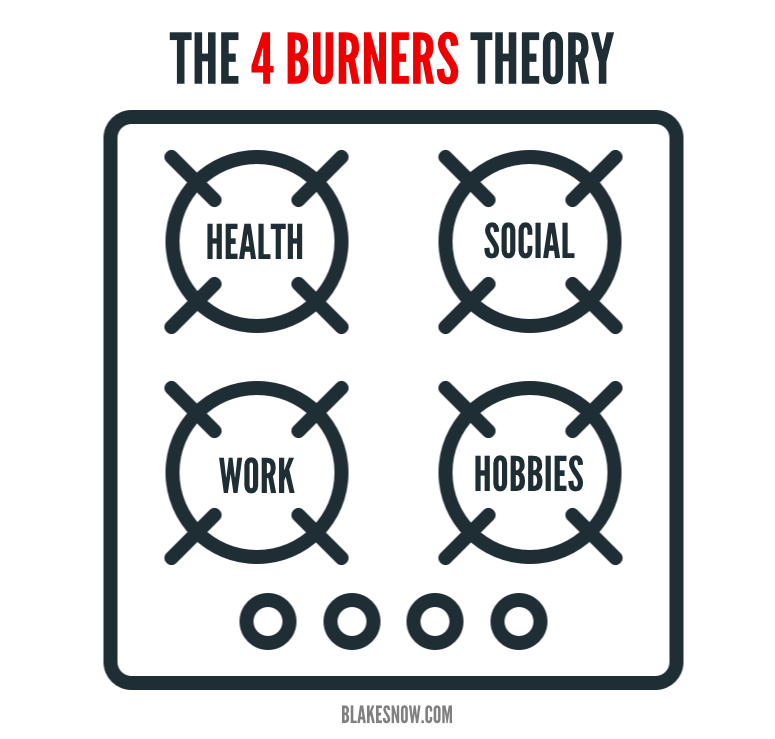
But since publishing the book, I’ve slightly updated the more traditional definition of the four burners. I do this by merging friends and family into a single “social” category, which many people already do, while adding “hobbies,” which is a huge area that humans devote time to. In that way, the updated burners cover all of your bases.
The same gas limits still apply, of course. If you want to be iconic at the expense of others, pick just one and jack up the heat (think: Steve Jobs). If you want to be great, pick only two burners and run ’em hot. If you want to be good, pick three burners and cook moderately. If you want to be well-rounded and multi-dimensional, slow burn all four.
The choice is yours. 🔥
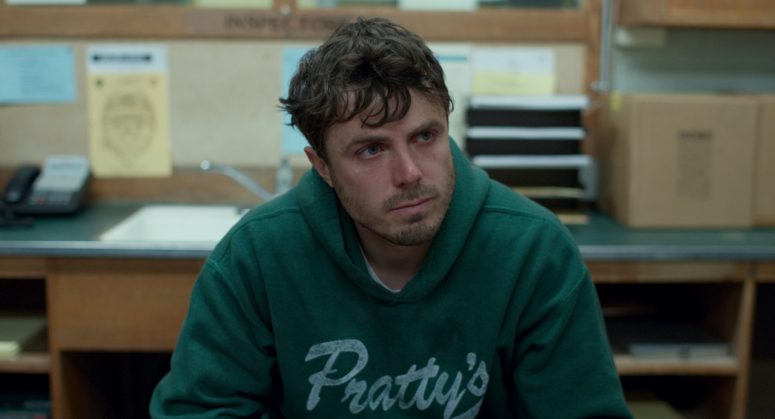
Courtesy Amazon Studios
My wife and I recently watched Manchester by the Sea. It’s a beautifully-acted but heart-wrenching story about a Boston man (played by Casey Affleck) that is left utterly devastated and largely alone after a careless act and some horrifying bad luck. In fact, it’s one of the saddest movies I’ve seen in years.
Although I appreciated the film, I forgot the importance of tragedy while exiting the theater. “For someone who is living in a comedy, is there any value in being reminded that life sucks sometimes?” I asked myself. “Is there any harm in solely watching movies with happy endings?”
With the help of the internet, this is what I learned: Continue reading…
 It’s not rocket science. To get the most of your day, we must do the following:
It’s not rocket science. To get the most of your day, we must do the following:
- Live by a daily prioritized calendar.
- Surround yourself with positive people by shunning toxic ones and resolving tensions directly.
- Break large tasks into smaller chunks (i.e. write chapters not books).
- Do work you can be proud of while limiting distractions (i.e. email, social media, doomscrolling, mindless diversions)
- Celebrate successes and overcome challenges with positive thinking.
Those are the most fulfilling habits I’ve adopted over the years, many of which are featured in Caroline Webb’s helpful How to Have a Good Day.
Although Webb spent too much time rehashing Kahneman’s groundbreaking Thinking Fast and Slow, I appreciated her earnestness in helping others.
Her formatting was also a little blocky, but the message rings true: “Studies have found we can reap immediate intellectual and emotional dividend from investing in exercise and sleep, or even from taking a moment to breathe deeply, smile broadly, and stand a little taller.”
TL;DR: Attitude is everything.
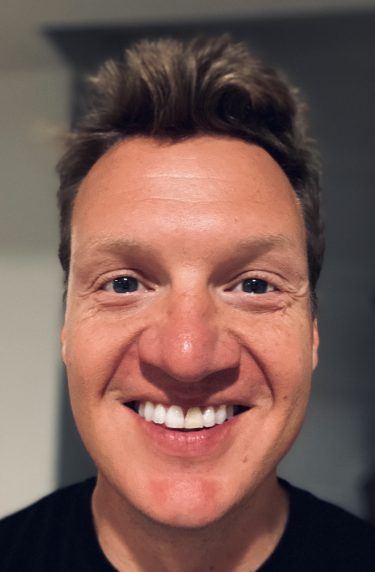 I was recently asked what I know for sure. I didn’t have time to answer everything in detail, but upon further reflection, this is what I would have told them.
I was recently asked what I know for sure. I didn’t have time to answer everything in detail, but upon further reflection, this is what I would have told them.
- We live on the most beautiful planet in the universe. There are over 400 million planets in our galaxy alone and an estimated 21 million more galaxies in the observable universe (i.e. the only part of space that we can see with telescopes and far reaching satellites). So far, we’ve only observed all brown, red, or blue planets with no water or diversity on them. We are literally living on a home that is 1 in several gazillion. The math doesn’t even make sense—it’s that rare, meaning there is a God or we won the greatest evolutionary lottery in the known universe. Either way it’s profoundly beautiful.
- Possessing a human body is a beautiful experience. I love the animal kingdom, but other species don’t hold a candle to the awesome existence of being a human. If you are reading this, again you won the universal lottery for most amazing species in the known universe. It. Is. Wonderful.
- Humans are inherently good. They can be trusted, they really do try, the sometimes change, and they will amaze you if you let them. Don’t let the lemons or fear mongers tell you otherwise. We would have not have gotten as far as we have as a species if that weren’t the case.
- The world is in good hands. On a similar note, people who say that youth cannot be trusted have no idea what they’re talking about because they only talk or listen to older people, especially loudmouth ones on TV. Having worked closely with youth for many years, they are even better than we are, just like we are largely better, more educated, more disciplined, and more empathetic than generations that came before us. Statistics bear this out, in fact. So don’t be old by saying the world is going to hell. It’s not, and younger generations will figure out the future just like we did, even if we don’t understand the new rules they play by. Continue reading…

creative commons
Craig Weiler has the answer:
You have one set of teeth, one set of knees, one set of lungs and one back. If you don’t take care of them, you can’t re-boot. You can get knee replacement surgery and you can get your teeth capped and wear dentures, or get new lungs, but it’s not the same as your originals. The back is much more tricky and if you damage it enough you’re never coming back from it.
You have one set of hands and feet. They are irreplaceable as is your brain. So if you damage them you’re never coming back from it.
Your body, in other words, is a one-off. You will never have another one as long as you live. If you start taking good care of it and you’re mindful in your 20’s, you’ll be far healthier and happier in your 50’s and beyond.”

Where should you spend most of your time? For maximum enjoyment, biggest impact, and lifelong fulfillment, the magic happens in the urgent/not important quadrant of President Eisenhower’s popular Decision Matrix.
Take nurturing a child or business, for example. Both are critical but rarely demand your immediate attention. In other words, quality time is never urgent. Fostering future sales is easy to put off, especially when current income is steady.
Obviously Eisenhower’s matrix isn’t the end-all, be-all of decision making. But I believe the most successful people in life—both personally and professionally—are the ones that ignore non-critical/non-urgent distractions the most. They don’t check or even react to their “inbox” as much as others, opting instead to focus on forward-thinking but non-urgent tasks.
And they delegate or otherwise prioritize urgent but unimportant tasks better than most.
The rerun first published to blakesnow.com in 2016
 I interviewed nearly two dozen experts this month (friends and strangers alike) for advice on my upcoming articles, new book, new nonprofit, and even new record. I cannot tell you how much I learned, and how many unseen rocks I was able to overturn with these empowering discussions.
I interviewed nearly two dozen experts this month (friends and strangers alike) for advice on my upcoming articles, new book, new nonprofit, and even new record. I cannot tell you how much I learned, and how many unseen rocks I was able to overturn with these empowering discussions.
Most of the people I spoke to donated an hour or more of their time. Several expressed a desire to talk further in the coming weeks. All of these people are busy building things and chasing their own dreams, so it’s surreal to have them be so generous with their limited time.
As an explanatory writer, I’ve always asked a lot of questions of people who are smarter than me. But in the last couple of years, I’ve made it a point to ask even more people for their advise and mentorship on the mountains I’m trying to climb.
While a handful of people respectfully decline, I’d say over 90% willingly speak to me, which is a powerful witness of humanity’s collaborative spirit. “It never hurts to ask” has blessed my life and work more times than I can count.
I’m thrilled and honored to be on team human.
I don’t always study philosophy, but when I do, I make it count.
Case in point: A friend and I were recently discussing the human condition over email. Exhilarating stuff, I know. I’ll skip to the best part.
Basically, we decided that humans struggle to internalize both complex and simple realizations. Complex ones because they’re harder to grasp, and simple takeaways because we’re usually too distracted by temptations, desires, and pleasures to see them through, even if we believe in them (or so argues Aristotle; more on him later).
At this point, I asked my buddy, “So if humans struggle to comprehend both complex and simple ideas, what in the HELL are we good at?”
His reply, “Entertainment. And nothing else.” Full stop. The gravity and strategic double periods of his remark made me do this:
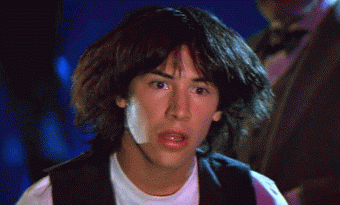
MGM Studios
At which point I enrolled in a 36-course undergraduate class from Smith College. Not exactly. But I did download the audible version of the class, The Meaning of Life: Perspectives from the World’s Greatest Thinkers, from Amazon!
Having already graduated (go, fight, win!), I did this solely for my own enlightenment. Little did I know how much impact professor Jay Garfield’s masterful curriculum would have on my worldview, existential outlook, and shared beliefs with others.
Here’s what I learned: Continue reading…
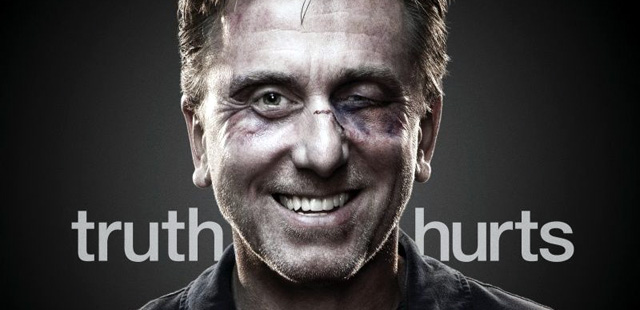
Here goes nothing. If I missed anything, set me straight in the comments: Continue reading…
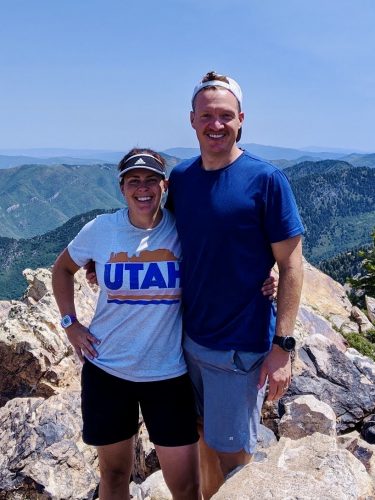
My wife and I at the summit of Olympus (courtesy Steven Smith)
I firmly believe that all humans are remarkable and average at the same time. As my father used to say, “We are all statistically average in most things, above average in a few things, and below average in many things.” Even Da Vinci, Einstein, and Mozart were average to mediocre in many areas of their lives.
The vast majority of us, however, are neither geniuses nor special. We must accept that, on the whole, we are average. That shouldn’t keep us from dreaming big and trying to be remarkable in a handful of special ways. But acceptance of our averageness can be a powerful motivator in the proper context.
Recently I summited Mount Olympus, an eight mile roundtrip hike that climbs (then drops) 1000 feet every mile. While approaching the difficult push to the top, my brother-in-law Steven blurted out, “I’m average—but average people make it!”
We all laughed out loud and immediately appreciated what he was reinforcing. That is, life is hard sometimes, but the average life overcomes hardship—at least on average.
It’s reassuring to know that over tens of thousands of years (and millions if you consider our ancestors), average humans have survived incredibly difficult things, over and over again. Pandemics. Floods. Pestilence. Earthquakes. Racism. Wars. Famine. Poverty.
We survive despite our averageness. And that makes us remarkable. 💪
This story first published to blakesnow.com in 2020
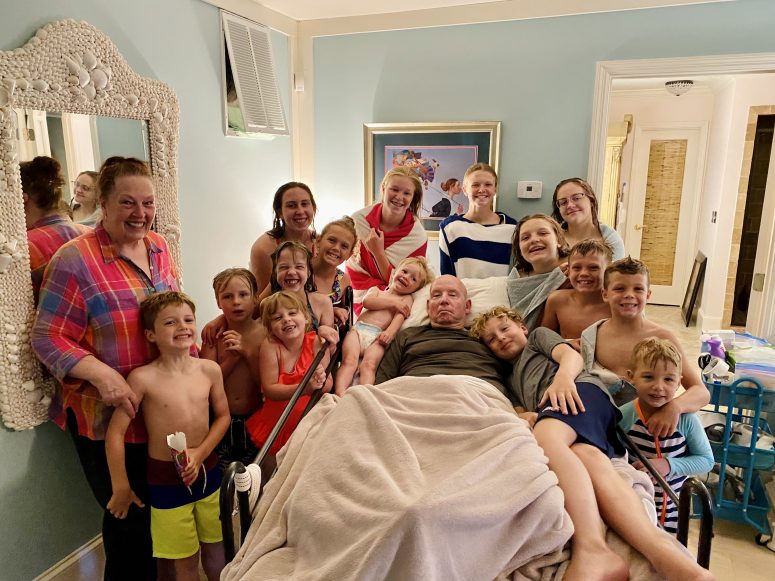
Brent Snow surrounded by his wife and grandkids
My dad is dying.
Two years after a disabling stroke that compounded his dementia, he is largely brain dead now and rapidly deteriorating. I haven’t spoken to him since Christmas. Even then it was like speaking to a toddler.
Bedridden for most of the year, he mumbles gibberish on occasion. But he mostly sleeps while confined to his bed on heavy medication. It’s deeply saddening.
Earlier this summer, my uncle said it best: “Your father was the smartest, most intelligent, and funniest of the three of us,” he said, speaking of the three brothers. “It’s heartbreaking to see him lose that gift before the rest of us.”
As terrible as it sounds, I’ve actively hoped for my father’s death all year. This is no way to live. I don’t fault any of my family members, however, for wanting to keep his warm, breathing body around. I fully trust my mother’s and nearby sibling’s selfless care of him.
We tried hard as a family to help him rally, but it wasn’t meant to be. On top of that, I take great comfort in my conviction that I will see him again, in all his glory, in the afterlife.
Some people think that’s fake news. But there’s no proof either way—which makes this beautiful, mysterious life on Earth all the more magical. Whatever happens, I hope you tell your dad you love him after reading this.
I’ll go first: Dad, I love you. I never got to say it with the knowledge that it would be my last time doing so, but I love you. Thank you for being an extraordinary and devoted father. I miss you.
Read also: 10 reasons my dad is awesome

I recently finished A Short History of Nearly Everything by Bill Bryson. From a single book I’ve never learned so much and so little at the same time. I’ve also never read a more absorbing science book. Whereas I usually highlight a few passages from each book, I highlighted more than two dozen parts of this book upon completion — it covers that much ground. Continue reading…

Wikimedia Commons
PROVO, Ut. — Want to get ahead in this world? Work lots of extra hours — even nights and weekends — experts say, and it will all be worth your while.
“It’s easy to forget what’s most important in life,” says Bill Loney, a certified life coach who hasn’t quite made it in life yet. “Family, friends, and social activities that can often inspire and enrich the life of an individual… these are all distractions in getting more work done,” he adds.
Emma Royds, who hasn’t stopped looking at her smartphone every five minutes for three straight years, councils that most people actually die wishing they had spent more time — not less — working. “People never regret working too much,” she says. “My neighbor opted to do adventurous, social, and fitness-related activities with family and friends in his spare time.
“Now 80, he told me recently he really wishes he would have spent more time on TPS cover sheets, obsessively trying to turn his company into the next big thing, and reading email during every waking hour of his life. It’s kind of sad, really.” Continue reading…

Me at my desk. Photo by Lindsey Snow
I was recently on a podcast to talk about my education and career path towards becoming a full-time freelance writer for the past 16 years. If you have 30 minutes to spare, I hope you enjoy my remarks. If you don’t have that much time, the short answer is lots of luck and persistence. Either way, I’m still pinching myself.
Thanks for having me on the show, Doug.
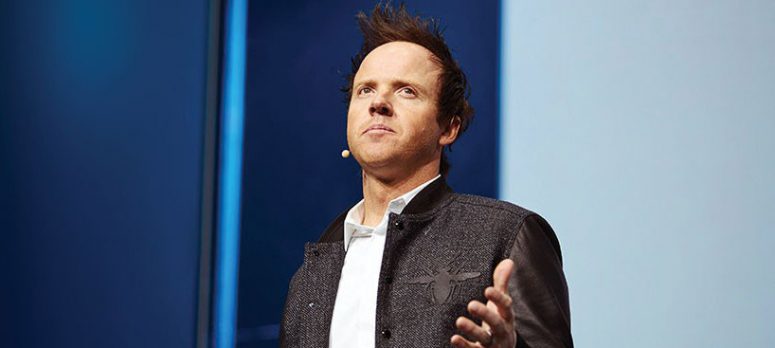
I recently enjoyed this commencement speech by Ryan Smith and hope you do too. It’s sweat advice on being “all in” in work, family, and our underlying beliefs.

My talented friend Davey Saunders is at it again. The below was first appeared on his Facebook page and is republished here with his permission. Pessimists are encouraged to skip this post.
Metaphorical waves roll into our lives on a pretty regular basis.
Emotional. Physical. Mental. Spiritual. Some we are able to ride out, some we can tuck under, and some break right on top of us —driving us helplessly into the water and currents beneath, until we regain our senses and are able to right ourselves again.
Some waves are rogue, and some come in sets that seem to have no end. There are times I have been, literally and figuratively, pulled from the grasp of the relentless seas. And there are times when I thought I had already drowned.
I am not upset by the challenges the ocean brings. If there was no water, how would I learn to swim? If there was no current to fight, how would I build the strength to hold on? And if there were no waves, how would I ever learn to surf?
So let them come. Let them bring their wrath and their might.
Just remember: with each shove and push from the waves, we are brought closer to shore. And then suddenly we find the furious roar that used to beat us down is now the very soothing sound of the surf… playing its sweet rhythms as we rest in the sand.

Courtesy Cinemagraphs
For most of my 20s, I largely existed to leave my mark upon the world and strike it rich. In order to achieve those goals, I labored through the day and voluntarily burned the midnight oil. In other words, I lived to work—how cliche of me!
As I approached 30, something happened. I experienced what I call my Montana Moment—cheesy, but catchy! I realized that my double life as a work-a-holic and present husband and father could no longer be sustained.
So I changed. I set strict boundaries on my time and never looked back. If I was going to be remarkable, I was going to have to do so in a set number of hours and no longer at the expense of my health, family, sleep, friendships, and self-improvement. (That change, by the way, was the catalyst behind my still unfinished book.) Continue reading…

For the record, I don’t consider myself a great writer. I’m certainly an effective, efficient, and sometimes amusing one. But I wouldn’t say great. The below, on the other hand, written by my friend Davey Saunders and published with his permission is great. I hope you enjoy it.
Continue reading…
As I often do, I cold emailed a bunch of people today asking if I could write for them. It was a great day. Not because one of them did this:
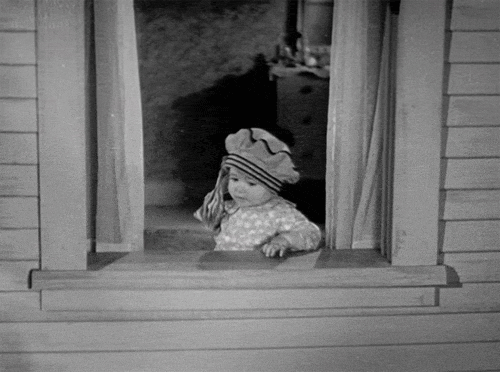
(They didn’t.) It was great because American strangers are wonderful to work with. They’re so freakin’ nice. Continue reading…

Eric Scott
A pottery teacher split her class into two halves.
To the first half she said, “You will spend the semester studying pottery, planning, designing, and creating your perfect pot. At the end of the semester, there will be a competition to see whose pot is the best”.
To the other half she said, “You will spend your semester making lots of pots. Your grade will be based on the number of completed pots you finish. At the end of the semester, you’ll also have the opportunity to enter your best pot into a competition.”
The first half of the class threw themselves into their research, planning, and design. Then they set about creating their one, perfect pot for the competition.
The second half of the class immediately grabbed fistfulls of clay and started churning out pots. They made big ones, small ones, simple ones, and intricate ones. Their muscles ached for weeks as they gained the strength needed to throw so many pots.
At the end of class, both halves were invited to enter their most perfect pot into the competition. Once the votes were counted, all of the best pots came from the students that were tasked with quantity. The practice they gained made them significantly better potters than the planners on a quest for a single, perfect pot.—As told by Eric Scott
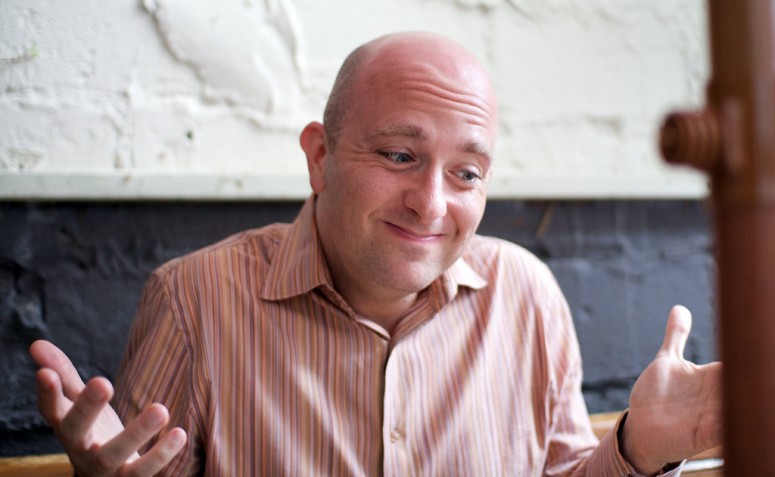
wikimedia commons
Several months ago, my wife and I were discussing truths we want are children to know. Although I’ve covered the topic before, I’ve since recognized several more while reiterating others.
Granted, you can’t expect to learn the below principles in a couple of sentences. But maybe, just maybe, this commentary will spark your curiosity and challenge your worldview for the better: Continue reading…
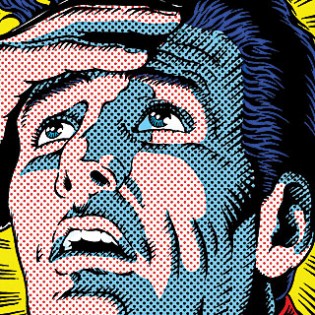 Six years ago, I wrote about 10 things that scare me. Since then, I’ve overcome many of those fears and have adopted new ones, so I think it’s time I updated my list. Here it is: 10 things that intimidate or otherwise worry me at this point in my life:
Six years ago, I wrote about 10 things that scare me. Since then, I’ve overcome many of those fears and have adopted new ones, so I think it’s time I updated my list. Here it is: 10 things that intimidate or otherwise worry me at this point in my life:
- Writing a book. Thanks to blogging and an insatiable curiosity, I’m a self-made writer. Since 2005, I’ve written tens of thousands of posts. I’ve also written hundreds of 800-6000 word feature stories, and thousands of pages of special reports, columns, product reviews, opinion pieces and analysis. And yet, writing a 10 chapter book seems so daunting to me. Go figure. It’s probably because the required focus conflicts with my ADA more than a writing project that typically lasts no more than a half day to a couple of weeks. Nevertheless, it’s my biggest professional fear. Continue reading…
 When I was younger and dumber, I used to work 11 hour weekdays, half-day Saturdays, and was mentally distracted with work for much of the rest of time. Although I work for myself and have a ridiculously flexible of schedule, I vacationed very little at the time. I was seeking fortune and professional notoriety. I thought 60+ hour work weeks would get me there faster.
When I was younger and dumber, I used to work 11 hour weekdays, half-day Saturdays, and was mentally distracted with work for much of the rest of time. Although I work for myself and have a ridiculously flexible of schedule, I vacationed very little at the time. I was seeking fortune and professional notoriety. I thought 60+ hour work weeks would get me there faster.
It did’t. It made me counter-productive, short-sighted, and less money on a per hour basis. In fact, Henry Ford discovered this 100 years ago, according to Inc.
Continue reading…
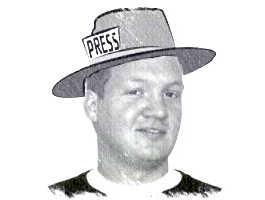 Since first subscribing to the daily paper this summer, I’ve been exposed to more Dear Abby columns than a 1950s trophy wife. The last one I read was horribly political, so I decided to guide the advice-seeker myself. Here goes:
Since first subscribing to the daily paper this summer, I’ve been exposed to more Dear Abby columns than a 1950s trophy wife. The last one I read was horribly political, so I decided to guide the advice-seeker myself. Here goes:
Dear Smooth Harold: My husband wanted to postpone having children until we were more financially secure. But I really wanted a baby, so he agreed, though only after I promised to return to work once the baby was born. That was a year ago. We now have a wonderful 2-month-old, and since “Avery” cam along, I realize how important it is for me to be at home with her. My husband disagrees. he says we need my salary in order to meet our financial obligations, and he is angry and upset that I won’t return to work. But I think there’s nothing as important as the nurturing a mother give her child. Who’s right?—R.F., Southern California
My reply:
Dear R.F.: Why on Earth would you ask me, a complete stranger, such an important question without knowing my background first? I could be a baby-snatcher for all you know, or completely against everything you believe in! But alas, perhaps you’re at your wits end and have no one to confide in. If that’s the case and you don’t feel comfortable anonymously researching different opinions online or posting to a message board, then I’ll indulge you. And I assure you I’m neither a baby-snatcher nor a posturing moral hypocrite. Continue reading…
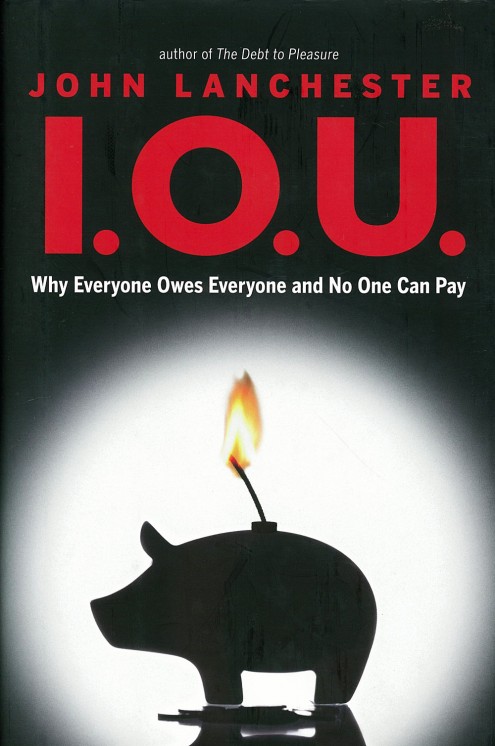
Fascinating book. To the point and practical.
For example, the best way to describe a retail bank is to call it a piggy bank. The best way to describe an investment bank is to call is a casino, which is precisely what each are.
Who knew a book about high finance, banking, and The Great Recession could be such a fun read?
 Since quitting Facebook in May, I periodically visit My Life Is Average for a good chuckle. Here are some of my favorite recent stories:
Since quitting Facebook in May, I periodically visit My Life Is Average for a good chuckle. Here are some of my favorite recent stories:
- Today, my brownie got detained in airport security. MLIA.
- Today, I discovered you can reuse calendars every eleven years. Guess who is using their 1999 calendar this year? MLIA.
- Today, I pushed a door that said pull. It opened. MLIA
- About a week ago, I went to the optometrist. While the doctor was looking at my eye, he told me to “open wide.” He was talking about my eye, but I automatically opened my mouth as wide as I could. MLIA.
- Today, I decided to make a grilled cheese sandwich in the toaster. Tomorrow, I’m getting a new toaster. MLIA
- Today I found a book called “How to Read a Book.” MLIA
- Today I was walking across the park and there were a bunch of teenagers. First kid smoking. Second kid smoking. Third kid smoking. Fourth kid was eating a apple. I think we know who the biggest rebel is. MLIA
- Tomorrow, my school has a spirit day. The theme is “Gender-Bender,” where boys wear girls clothes and vice versa. My father, knowing nothing of this, comes downstairs to find me in a jean miniskirt, gray tank top, black leggings, trying to put my hair in a suitable girly fashion. We stare at each other awkwardly, and without saying a word, he turns and walks back upstairs, shaking his head. MLIA.
- Today, I read last year 4,153,237 ppl got married. I don’t want to start any trouble, but shouldn’t that be an even number? MLIA
- Today, my shoe laces came untied. I tied them back up and carried on. MLIA
- Four years ago, when i was 18, i noticed at night that my front window is very reflective, so i was pretending to dive in slow motion and shoot, dual pistol style. Suddenly a really hot girl walked past and i was startled and fell over. Embarrassed i waited for a bit and then stood up. As i stoop up i saw her slowly shooting an imaginary rifle from behind a car. We then proceeded to do this for 10 minutes until she did an extremely dramatic death. She wasn’t getting up so i went outside to meet her. Once i got to where she was, there was nothing but a piece of paper with a mobile number on it. Today, we are getting married. MLIA
MLIA.
 This is an interesting survey of half a million Americans, according to Yahoo News:
This is an interesting survey of half a million Americans, according to Yahoo News:
People’s emotional well-being — happiness — increases along with their income up to about $75,000, researchers report in Tuesday’s edition of Proceedings of the National Academy of Sciences.
For folks making less than that, said Angus Deaton, an economist at the Center for Health and Wellbeing at Princeton University, “Stuff is so in your face it’s hard to be happy. It interferes with your enjoyment.”
Happiness got better as income rose but the effect leveled out at $75,000, Deaton said. “Giving people more income beyond 75K is not going to do much for their daily mood … but it is going to make them feel they have a better life.”
In a temporal sense, I believe it.
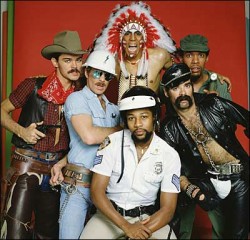 BBC recently cited a study that found the more friends you have, the more you earn. After observing 10,000 U.S. students over a period of 35 years, the study showed that the wealthiest people were those that had the most friends at school. Each extra school friend added 2% to the salary.
BBC recently cited a study that found the more friends you have, the more you earn. After observing 10,000 U.S. students over a period of 35 years, the study showed that the wealthiest people were those that had the most friends at school. Each extra school friend added 2% to the salary.
The take away: The more people you talk to (i.e. network with), the more chances you have to sell yourself as a likable person. The more likable you are in the eyes of others, the higher chance you have of being retained for professional help. That goes for “in school” and in life.
So don’t be an introvert. Talk to people. Take an interest. It takes a village.
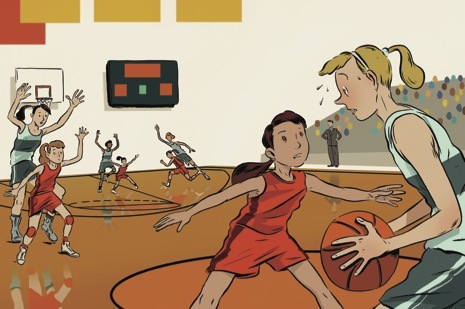
New Yorker
I just got done reading Malcolm Gladwell’s How David Beats Goliath: When underdogs break the rules. It’s brilliant. The most inspiring essay I’ve read in at least two years. Instead of getting in the way, I’m just going to point you there, admonish you to print the 7,000 words, and read it. Afterwhich, you should full court press, challenge conventional wisdom, and display chutzpah for the rest of your life.
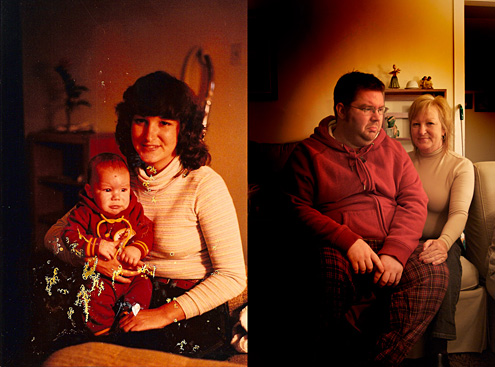
These are great! [via Digg]


















 It’s not rocket science. To get the most of your day, we must do the following:
It’s not rocket science. To get the most of your day, we must do the following: I was recently asked what I know for sure. I didn’t have time to answer everything in detail, but upon further reflection, this is what I would have told them.
I was recently asked what I know for sure. I didn’t have time to answer everything in detail, but upon further reflection, this is what I would have told them.

 I interviewed nearly two dozen experts this month (friends and strangers alike) for advice on my upcoming articles,
I interviewed nearly two dozen experts this month (friends and strangers alike) for advice on my upcoming articles, 













 Six years ago, I wrote about
Six years ago, I wrote about  When I was younger and dumber, I used to work 11 hour weekdays, half-day Saturdays, and was mentally distracted with work for much of the rest of time. Although I work for myself and have a ridiculously flexible of schedule, I vacationed very little at the time. I was seeking fortune and professional notoriety. I thought 60+ hour work weeks would get me there faster.
When I was younger and dumber, I used to work 11 hour weekdays, half-day Saturdays, and was mentally distracted with work for much of the rest of time. Although I work for myself and have a ridiculously flexible of schedule, I vacationed very little at the time. I was seeking fortune and professional notoriety. I thought 60+ hour work weeks would get me there faster. Since first subscribing to the
Since first subscribing to the 
 Since
Since  This is an
This is an  BBC
BBC 
